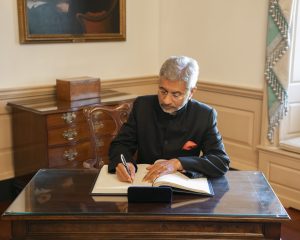Speaking at the launch of his new book “The India Way: Strategies for an Uncertain World” earlier today at a virtual event organized by a New Delhi think tank, Indian Foreign Minister Subrahmanyam Jaishankar noted that the recent shift in U.S. position about its global role and the rise of China are the two of the most pressing issues shaping the international system today. Celebrated in a four-decade plus career as a diplomat, the cerebral Jaishankar assumed his cabinet role last year after Narendra Modi won a second term as India’s prime minister. Jaishankar had previously been India’s foreign secretary and ambassador to China as well as the United States, along with holding other key positions in the foreign ministry.
Jaishankar – whose book seeks to present a big picture analysis of the world India now finds itself in and present strategies to deal with it – reiterated a claim that has increasingly become a trademark assertion of India’s foreign policy under Modi in his second term: That “the world of agreements are over,” and instead, a future world order will revolve around issue-based convergence between countries. As I have recently written in these pages, this formulation is what has allowed India to simultaneously engage Russia and China on one hand, and the United States, Japan, and Australia on the other without appearing to be contradictory.
Speaking of BRICS, Jaishankar noted that one of the benefits of the grouping was that it allowed India to have a transcontinental reach including into South America. He also noted India’s need to engage with the West — though not solely by focusing on the country’s relationship with the U.S. — emphasizing his government’s outreach efforts to Europe. While Jaishankar claimed that India’s traditional posture of strategic autonomy should not be confused with “strategic ambiguity,” a diverse basket of relationships still remains the mainstay of India’s foreign policy.
Jaishankar emphasized the importance of making strategic choices, and not simply “debating them.” And to the Narendra Modi government’s credit, it has taken relatively bold decisions in the past six years, most notably by deepening India’s defense relationships with key Indo-Pacific countries including the United States. But increasingly it is clear that the U.S. and India are often on different pages, on issues big and small.
For example, on Monday the U.S. Deputy Secretary of State Stephen Biegun announced that a ministerial-level meeting of the Quad was going to be held as an in-person meeting in New Delhi soon. At today’s event, Jaishankar refused to confirm this, clarifying that while discussions around a Quad ministerial meeting were ongoing, no decision had been made about its location or date. At the same time, Jaishankar will participate in the BRICS foreign-ministers meeting virtually tomorrow, as well as fly to Moscow next week for a Shanghai Cooperation Organization meeting. Whether such dithering stems from scheduling issues, uncertainty around the outcome of the upcoming elections in the U.S. or from the prospect of further burning bridges with Beijing remains unknown.
Jaishankar remarks toward China sounded relatively conciliatory in face of a deepening military crisis between India and China which shows no signs of abating. Repeatedly caveating his remarks with the assertion that none of them were to downplay the gravity of the situation in eastern Ladakh, Jaishankar emphasized the need for both countries to reach an accommodation. He pointedly noted he was not comfortable with the characterization of the situation by some as a “Himalayan Cold War,” and asserted that diplomacy remained the only way out of the current imbroglio.
In terms of his vision for what a “Brand India” should be, Jaishankar noted the country’s democratic credentials – which he claimed has become especially important since the end of the Cold War – and its growing professional middle class, noticeably abroad.

































